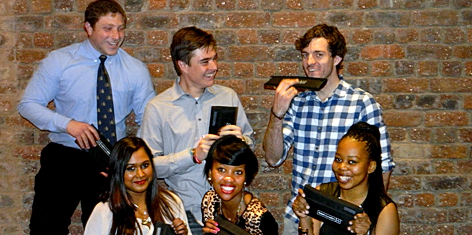Latest News Archive
Please select Category, Year, and then Month to display items
02 January 2025
|
Story Gerda-Marie van Rooyen
|
Photo Supplied
 Leading the research in South Africa is Prof Linus Franke from the Department of Soil, Crop and Climate Sciences.
Leading the research in South Africa is Prof Linus Franke from the Department of Soil, Crop and Climate Sciences.
Scientists are actively pursuing the successful breeding of diploid hybrid potatoes from inbred lines. This is expected to revolutionise potato breeding as it holds the key to rapid genetic progress. It will introduce new varieties for commercialisation through seed. Currently, existing potato variants have a gene that renders self-pollinated seeds infertile.
Prof Linus Franke, an academic in the Department of Soil, Crop and Climate Sciences at the UFS, is leading the research in South Africa. “This technology allows the production of genetically uniform potato seed that is easy to transport and largely disease-free.” He says this differs from conventional breeding whereby only vegetative propagation is possible due to tetraploid varieties in potatoes. It also risks carrying pests and diseases from one generation to the next – leading to the accumulation of pests and diseases with each round of multiplication.
Seed innovation
Prof Franke explains that Solynta BV, a seed company based in the Netherlands that produces potato varieties that can be grown from seed, has included South Africa in their research efforts because it is one of Africa’s largest producers and exporters. Through his academic relationship with Wageningen University and Research, a Dutch institution renowned for its agricultural endeavours and food production, the UFS became involved in researching hybrid potatoes grown from seed.
Diploid seeds containing two sets of chromosomes allow easier gene manipulation to increase predictability and speedier genetic progress. The breeding approach enables the incorporation of tolerance to pests, diseases, abiotic stresses (cold, heat, drought) and other desired genetic traits.
Although Prof Franke is optimistic about this research, he is not blind to disadvantages. “Potato seeds are tiny and have little energy reserves, making it harder to grow potatoes from seed than from tubers.” He says potatoes from seed will take longer to cultivate than tubers, as farmers need to grow plantlets from seeds first, adding six weeks to the growing period. “It is possible that commercial farmers can grow potatoes directly from seed. Alternatively, perhaps more likely, specialised growers will produce tubers of potatoes from seed; these tubers are then sold as seed tubers to other potato farmers, who then continue their normal practices of producing potatoes for the market from tubers.”
Financial benefits
Prof Franke says farmers have reason to get excited. “Seed potatoes will reduce input costs, as varieties with enhanced tolerance to pests and diseases require less pesticides. Planting one hectare of potatoes requires three to four tonnes of potato tubers, but only one 25 g packet of potato seeds.” Since potatoes are a more valuable commodity than maize, this technology might also increase farmers’ income potential.
Six of our students on their way to Stanford Sophomore College
2014-08-21

Back, from the left are: Philip Kitsopoulos (BCom Law), Ulrich Kristen (Medicine)
and Stephan Erasmus (Medicine).
The university hosted a send-off function for our students who are about to attend a three-week seminar at Stanford Sophomore College (SoCo).
Six Kovsie students were selected to attend the seminar at the Stanford SoCo in September 2014. This programme is an immersive learning experience where participants attend class meetings during the morning. Their afternoons include class activities, explorations of Stanford, field trips as well as organised events.
UFS students were invited to apply for one of six SoCo courses in February 2014. After months of apprehension, the successful Kovsie applicants were announced in May this year.
These outstanding Kovsie students and the courses they will attend are:
- Sebabatso Makafane, Vuyisile Kubeka and Philip Kitsopoulos – New Millennium Mix: Crossings of Race and Culture;
- Ulrich Kristen – Resistance Writings in Nazi Germany;
- Kaylene Pillay – Ghost Stories: Why the Dead Return and What They Want From Us; and
- Stephan Erasmus – Responses to the AIDS Epidemic.
During the farewell function, Rudi Buys: Dean of Student Affairs, handed the students their flight tickets and visas. This was followed by messages of support from Dr Lis Lange, Directorate for Institutional Research and Academic Planning, and Prof Neil Roos from the Centre for Africa Studies.
Prof Roos concluded the evening’s programme with some advice for these students. “Don’t go there and come back to copy the students and personalities you meet there. Go there and show your own characteristics to them.”
The six Kovsies will depart on 29 August and return home on 19 September 2014.